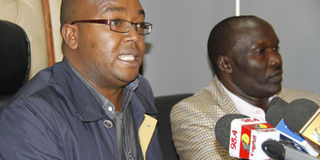Government allays fears of Ebola virus in Kenya

Director of Medical Services Dr Nicholas Muraguri (left) and Principal Secretary, Ministry of Health Prof Fred Segor on Saturday August 9, 2014 addressing the media. Kenya is training 30,000 health workers to screen and manage suspected Ebola cases to ensure the disease does not enter the country. PHOTO | JEFF ANGOTE
What you need to know:
- A passenger isolated on Friday at JKIA after showing Ebola-like symptoms has tested negative for the virus.
- The passenger was headed to Lubumbashi in the DRC via Nairobi from Kampala.
- He had been scheduled to board a connecting KQ flight on Friday evening when he started vomiting.
- Health officials said he was suffering from food poisoning
A passenger isolated on Friday at the Jomo Kenyatta International Airport (JKIA) after showing Ebola-like symptoms has tested negative for the virus.
The Ministry of Health Saturday evening announced that the traveller, a 43-year old Congolese was only suffering from food poisoning and not the deadly disease that has so far killed more than 960 people in West Africa.
“Laboratory tests conducted at the Kenya Medical Research Institute (Kemri) have found that a passenger is free of Ebola virus,” Dr Nicholas Muraguri, the Director of Medical Services told reporters in Nairobi.
“He has since improved markedly on treatment and is likely to be discharged tomorrow,” he added.
The passenger was headed to Lubumbashi in the Democratic Republic of Congo (DRC) via Nairobi from Entebe aboard flight KQ 417.
He had been scheduled to board a connecting Kenya Airways flight on Friday evening when he started vomiting.
What followed was fear and panic as health attendants showed up at the Kenyatta National Hospital isolation ward with the man.
“I understand what caused fear was the fact that our nurses were wearing protective gear. People assumed that this was Ebola. But the first thing we are doing is to protect the health workers,” Health PS Fred Sigor said.
ADEQUATE MEASURES
“I want to assure everyone that we have put in place adequate measures and the Ministry of Health is working closely with other government agencies to ensure that we move in the same direction,” he added.
Saturday evening, health officials began screening passengers passing through the Jomo Kenyatta International Airport (JKIA) to other destinations in a bid prevent possible spread of the Ebola virus into East Africa.
The decision followed Thursday’s crisis meeting by the National Aviation Pandemic Preparedness Committee which resorted to employ further measures to fight the deadly virus.
The committee is tasked to look at measures to be used to avoid the spread of contagious diseases through air transport and includes the Kenya Airports Authority (KAA), Kenyatta National Hospital, Kenya Airways, Kemri, immigration officers and other related government agencies.
Since the Ebola outbreak in March 2014, JKIA has only been screening passengers from West Africa coming to Kenya as the final destination.
Saturday, Port Health Officer at the JKIA Mohammed Duba told the Nation that the decision to vet passengers on transit had nothing to do with the incident.
SCREEN PASSENGERS
“Initially we could not screen transiting passengers because the Port Health desk was only at the arrivals,” he said in an interview at JKIA.
“But now, the Kenya Airports Authority (KAA) has provided us with another desk to capture both transiting and arriving passengers. It has always been in the pipeline,” he added.
This new desk will be situated at Gate 3 and will now mean that all passengers from West Africa using Kenya Airways, Ethiopian Airlines and Rwandair will be checked before they come in or board another plane.
The Ebola virus whose outbreak the World Health Organization (WHO) on Friday declared an international public health emergency has 90 per cent fatality.
In West Africa, more than 960 people have died in Guinea, Sierra Leone, Liberia and Nigeria ever since it first emerged in March.
But Kenyans are worried because major airlines like Kenya Airways, Rwandair and Ethiopian fly to cities in these countries every day.
KQ said Friday it will not stop flights to West Africa since the best advice from global health authorities shows that the risk to most travellers remains low but said that handgun thermometers, gloves and hand sanitizers have been provided to staff at Free Town, Monrovia, Accra, Lagos and Abuja.
Saturday evening, Mr Sigor said that any cancellation of flights to West Africa will be determined by shared information between countries in the region.
“It is not just Kenya Airways which goes to West Africa. Ethiopian and Rwandair fly people between Nairobi and these cities,” he said.
“If it reaches a point of taking that decision (to cancel flights), we will do that, but it will be after consultations with our neighbouring countries as well as international partners such as IATA (International Air Transport Association),” he added.
KQ announced that travellers will also be screened by doctors in Nairobi before boarding aircraft for other destinations or being allowed out of the airport.
SEPARATE GATE
“All passengers arriving at JKIA from West Africa and Entebbe, and whose final destination is Nairobi, are now using a separate gate on arrival where screening will be done before their release to Immigration officials, and into the country,” a statement signed by outgoing chief executive Titus Naikuni reads.
“Port Health, a division of the Ministry of Health responsible for disease surveillance and public health control at all points of entry, will regularly inform the various county health teams of persons who have travelled to their counties as per surveillance forms.
“Adequate arrangements have been put in place to avoid delays and misconnection,” Kenya Airways says.
“Kenya Airways provides Port Health details on the flights expected and numbers of transit and terminating passengers beforehand to facilitate planning for the screening.
“We continuously monitor updates from World Health Organisation, Centres for Disease Control and the International Air Transport Association on the disease, its spread and for guidelines on recommended actions,” KQ further said.




